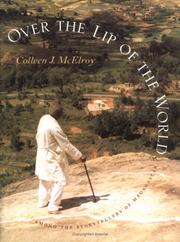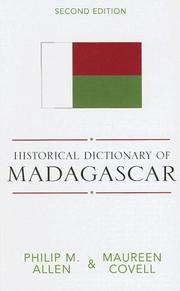| Listing 1 - 10 of 20 | << page >> |
Sort by
|
Book
ISSN: 22106243 ISBN: 9004233725 9789004233720 9789004223974 9004223975 Year: 2012 Volume: 3 Publisher: Leiden Boston
Abstract | Keywords | Export | Availability | Bookmark
 Loading...
Loading...Choose an application
- Reference Manager
- EndNote
- RefWorks (Direct export to RefWorks)
This book provides a detailed study of nominalizing patterns in Malagasy (Austronesian) and discusses the broader theoretical issues that arise from these patterns. It explores new and original fieldwork data drawn from the largely unexplored domain of Malagasy deverbal nominals. Offering new insights to long-standing puzzles in the derivation of argument-structure, referential, and clausal nominals, the book promotes a single structure-building mechanism, which allows nominalizers to attach at different heights in the clausal spine to derive nominals with different morphosyntactic properties. In addition, it provides a novel analysis of participant nominalizations, showing that they are derived through the same mechanism that derives relative clauses, and thus setting the stage for new and exciting research directions.
Malagasy language --- Hova dialect --- Malgache language --- Merina dialect --- Malayan languages --- Grammar. --- Nominals. --- Syntax.
Book
ISBN: 9781107036093 1107036097 9781139565882 9781461955047 1461955041 1139565885 9781107468542 110746854X 9781107465046 1107465044 1107461316 9781107461314 1139889761 9781139889766 1107459257 9781107459250 1107473152 9781107473157 1107472148 9781107472143 Year: 2014 Publisher: New York
Abstract | Keywords | Export | Availability | Bookmark
 Loading...
Loading...Choose an application
- Reference Manager
- EndNote
- RefWorks (Direct export to RefWorks)
Nineteenth-century highland Madagascar was a place inhabited by the dead as much as the living. Ghosts, ancestors and the possessed were important historical actors alongside local kings and queens, soldiers, traders and missionaries. This book considers the challenges that such actors pose for historical accounts of the past and for thinking about questions of presence and representation. How were the dead made present, and how were they recognized or not? In attending to these multifarious encounters of the nineteenth century, how might we reflect on the ways in which our own history-writing makes the dead present? To tackle these questions, Zoë Crossland tells an anthropological history of highland Madagascar from a perspective rooted in archaeology and Peircean semiotics, as well as in landscape study, oral history and textual sources.
Ethnology --- Semiotics --- Dead --- Landscapes --- Merina (Malagasy people) --- Missions --- Ethnology. --- Missions. --- Religion. --- Semiotics. --- Religious aspects. --- Symbolic aspects --- Symbolic aspects. --- 1800-1899. --- Madagascar --- Imerina (Madagascar) --- Madagascar. --- History --- Religion --- Antimerina (Malagasy people) --- Hova (Malagasy people) --- Hovas --- Imerina (Malagasy people) --- Ovah (Malagasy people) --- Countryside --- Landscape --- Natural scenery --- Scenery --- Scenic landscapes --- Nature --- Dead (in religion, folk-lore, etc.) --- Semeiotics --- Semiology (Linguistics) --- Semantics --- Signs and symbols --- Structuralism (Literary analysis) --- Imerina, Madagascar --- Emyrne (Madagascar) --- Imaïrne (Madagascar) --- Madagaskar --- Democratic Republic of Madagascar --- Repoblika Demokratika n'i Madagaskar --- Repoblika Demokratika Malagasy --- République démocratique de Madagascar --- RDM --- Repoblikan'i Madagasikara --- République de Madagascar --- Repoblikan'i Madakasikara --- Madagasikara --- Republic of Madagascar --- マダガスカル --- Madagasukaru --- מדגסקר --- Malagasy Republic

ISBN: 9780295997643 0295997648 0295978244 9780295978246 Year: 1999 Publisher: Seattle, Wa. : University of Washington Press,
Abstract | Keywords | Export | Availability | Bookmark
 Loading...
Loading...Choose an application
- Reference Manager
- EndNote
- RefWorks (Direct export to RefWorks)
Oral tradition --- Storytelling --- Mythology, Malagasy. --- Story-telling --- Telling of stories --- Oral interpretation --- Children's stories --- Folklore --- Oral interpretation of fiction --- Tradition, Oral --- Oral communication --- Oral history --- Malagasy mythology --- Performance --- Mythology, Malagasy --- Madagascar --- Malagasy Republic --- Madagaskar --- Democratic Republic of Madagascar --- Repoblika Demokratika n'i Madagaskar --- Repoblika Demokratika Malagasy --- République démocratique de Madagascar --- RDM --- Repoblikan'i Madagasikara --- République de Madagascar --- Repoblikan'i Madakasikara --- Madagasikara --- Republic of Madagascar --- マダガスカル --- Madagasukaru --- מדגסקר
Book
ISBN: 9781909254077 9781909254084 190925407X 1909254088 9781909254091 1909254096 1909254061 9781909254060 1909254053 9781909254053 2821854102 Year: 2013 Publisher: Open Book Publishers
Abstract | Keywords | Export | Availability | Bookmark
 Loading...
Loading...Choose an application
- Reference Manager
- EndNote
- RefWorks (Direct export to RefWorks)
How to Read a FoIktale offers the first English translation of Ibonia, a spellbinding tale of old Madagascar. Much of its plot sounds familiar: a powerful royal hero attempts to rescue his betrothed from an evil adversary and, after a séries of tests and duels, he and his lover are joyfully united with a marriage that affirms the royal lineage. These fairytale elements link Ibonia with European folktales, but the taie is still very much a product of Madagascar. It contains African-style praise poetry for the hero; it presents Indonesian-style riddles and poems; and it inflates the form of folktale into epic proportions. Recorded when the Malagasy people were experiencing European contact for the first time, Ibonia proclaims the power of the ancestors against the foreigner. Through Ibonia, Lee Haring expertly helps readers to understand the very nature of folktales. His définitive translation, originally published in 1994, has now been fully revised to emphasize its poetic qualities, while his new introduction and detailed notes give insight into the fascinating imagination and symbols of the Malagasy. Haring's research connects this exotic narrative with fundamental questions not only of anthropology but also of literary criticism.
Tales --- Folklore --- Mythology, Malagasy. --- Malagasy mythology --- Folk beliefs --- Folk-lore --- Traditions --- Ethnology --- Manners and customs --- Material culture --- Mythology --- Oral tradition --- Storytelling --- folklore --- oral literature --- oral tradition --- African folklore studies --- Ibonia --- Madagascar --- folktales --- tales
Periodical
ISSN: 20418345 2042809X ISBN: 129947540X 1841506850 9781841506852 1841504742 9781841504742 Publisher: Bristol
Abstract | Keywords | Export | Availability | Bookmark
 Loading...
Loading...Choose an application
- Reference Manager
- EndNote
- RefWorks (Direct export to RefWorks)
As they set off for Madagascar in 2003, photographer Max Pam and writer Stephen Muecke adopted as their guiding principle the idea of contingency-central to which is the conscious embrace of risk and chance.
Contingency (Philosophy) --- Madagascar --- Description and travel. --- Madagaskar --- Democratic Republic of Madagascar --- Repoblika Demokratika n'i Madagaskar --- Repoblika Demokratika Malagasy --- République démocratique de Madagascar --- RDM --- Repoblikan'i Madagasikara --- République de Madagascar --- Repoblikan'i Madakasikara --- Description and travel --- Madagasikara --- Republic of Madagascar --- マダガスカル --- Madagasukaru --- מדגסקר --- Philosophy --- Malagasy Republic --- Photography, Artistic --- Photography --- Photographie artistique
Multi
ISSN: 09249389 ISBN: 1283854996 9004242120 9789004242128 9789004240827 9004240829 9781283854993 Year: 2013 Volume: 42 Publisher: Leiden Boston
Abstract | Keywords | Export | Availability | Bookmark
 Loading...
Loading...Choose an application
- Reference Manager
- EndNote
- RefWorks (Direct export to RefWorks)
Building God’s Kingdom studies how the encounter with nineteenth century Madagascar influenced the Norwegian Protestant mission. Drawing upon rich Norwegian and Malagasy sources, entangled and multivocal stories are allowed to unfold, revealing the complex dynamics of mission encounters. Tracing Malagasy agency and pursuit of churchly independence in pre-colonial and colonial Madagascar, this study explores the power-struggles between the Malagasy, the missionaries and between the mission in Norway and Madagascar. Through careful attention to context and agency, Karina Hestad Skeie provides new perspectives on the interplay between the local and the global in Christian missions, and on the centrality and restrictions of local agency on mission policy.
Missions, Norwegian --- Norwegian missions --- History --- Madagascar --- Madagaskar --- Democratic Republic of Madagascar --- Repoblika Demokratika n'i Madagaskar --- Repoblika Demokratika Malagasy --- République démocratique de Madagascar --- RDM --- Repoblikan'i Madagasikara --- République de Madagascar --- Repoblikan'i Madakasikara --- Madagasikara --- Republic of Madagascar --- マダガスカル --- Madagasukaru --- מדגסקר --- Malagasy Republic --- Church history --- Missions, Norwegian - Madagascar - History - 19th century. --- Madagascar - Church history - 19th century.

ISBN: 0810865319 9780810865310 0810846365 9780810846364 Year: 2005 Volume: no. 98 Publisher: Lanham, Md. Scarecrow Press
Abstract | Keywords | Export | Availability | Bookmark
 Loading...
Loading...Choose an application
- Reference Manager
- EndNote
- RefWorks (Direct export to RefWorks)
History & Archaeology --- Regions & Countries - Africa --- Madagascar --- Madagaskar --- Democratic Republic of Madagascar --- Repoblika Demokratika n'i Madagaskar --- Repoblika Demokratika Malagasy --- République démocratique de Madagascar --- RDM --- Repoblikan'i Madagasikara --- République de Madagascar --- Repoblikan'i Madakasikara --- Madagasikara --- Republic of Madagascar --- マダガスカル --- Madagasukaru --- מדגסקר --- Malagasy Republic --- History
Book
ISBN: 9782709924085 2709924080 2709924099 Year: 2018 Publisher: Marseille : IRD Éditions,
Abstract | Keywords | Export | Availability | Bookmark
 Loading...
Loading...Choose an application
- Reference Manager
- EndNote
- RefWorks (Direct export to RefWorks)
"La situation économique de Madagascar est singulière à plus d'un titre. D'une part, le niveau de vie des Malgaches ne cesse de régresser depuis l'indépendance en 1960, un cas unique pour un pays qui n'a pas connu de conflits majeurs ; d'autre part, à chaque fois que le pays s'est engagé sur la voie de la croissance, celle-ci a été brutalement interrompue par une crise socio-politique mettant à bas les espoirs suscités. Pour éclairer ce contexte spécifique, les auteurs décryptent l'"énigme" et le "paradoxe" malgaches en procédant à une lecture d'économie politique dans le temps long et en s'appuyant sur des données statistiques de première main. La trajectoire du pays est analysée à l'aune des théories du développement. L'identification des rentes et des stratégies d'acteurs, le rôle de la violence, le fonctionnement des institutions, la sociologie des élites malgaches ainsi que le rapport entre les citoyens et le pouvoir sont également parmi les grands thèmes traités. En dépit de sa spécificité, Madagascar apparaît à la lumière de cette analyse comme emblématique d'une situation commune à de nombreux pays du Nord comme du Sud. La fragilité des coalitions entre élites y nourrit une instabilité systémique d'autant plus grande qu'elle vient se greffer sur un mécontentement populaire récurrent. En effet, même dans les rares périodes fastes, les aspirations au progrès des Malgaches se sont toujours heurtées aux dures réalités du quotidien. Un ouvrage à la fois documenté et accessible, pour mieux comprendre Madagascar et appréhender les différentes dimensions du développement au Sud."--Page 4 of cover.
Économie politique --- Madagascar --- Economic conditions --- Politics and government --- Social conditions. --- Economic policy. --- Madagaskar --- Democratic Republic of Madagascar --- Repoblika Demokratika n'i Madagaskar --- Repoblika Demokratika Malagasy --- République démocratique de Madagascar --- RDM --- Repoblikan'i Madagasikara --- République de Madagascar --- Repoblikan'i Madakasikara --- Madagasikara --- Republic of Madagascar --- マダガスカル --- Madagasukaru --- מדגסקר --- Malagasy Republic --- Economics --- Political Science Public Admin. & Development --- théorie du développement --- théorie économique --- économie politique --- croissance économique --- politique économique --- structure sociale --- rapports sociaux --- anthropologie politique --- crise politique --- crise sociale --- gouvernance

ISBN: 052092682X 1597346187 9780520926820 0585391262 9780585391267 9780520228450 0520228456 9780520228467 0520228464 9781597346184 Year: 2001 Volume: 1 Publisher: Berkeley, Calif. University of California Press
Abstract | Keywords | Export | Availability | Bookmark
 Loading...
Loading...Choose an application
- Reference Manager
- EndNote
- RefWorks (Direct export to RefWorks)
While doing fieldwork in a village in east Madagascar that had suffered both heavy settler colonialism and a bloody anticolonial rebellion, Jennifer Cole found herself confronted by a puzzle. People in the area had lived through almost a century of intrusive French colonial rule, but they appeared to have forgotten the colonial period in their daily lives.
Betsimisaraka (Malagasy people). --- Betsimisaraka (Malagasy people)-- History. --- Memory. --- Violence. --- Betsimisaraka (Malagasy people) --- Memory --- Violence --- History & Archaeology --- Regions & Countries - Africa --- Retention (Psychology) --- Intellect --- Psychology --- Thought and thinking --- Comprehension --- Executive functions (Neuropsychology) --- Mnemonics --- Perseveration (Psychology) --- Reproduction (Psychology) --- Betsimisaraka --- Betsimaraka (Malagasy people) --- Ethnology --- History --- Attitudes --- Social aspects --- #SBIB:39A4 --- #SBIB:39A73 --- #SBIB:96G --- Violent behavior --- Social psychology --- Toegepaste antropologie --- Etnografie: Afrika --- Geschiedenis van Afrika --- Ambodiharina (Madagascar) --- France --- Madagascar --- Bro-C'hall --- Fa-kuo --- Fa-lan-hsi --- Faguo --- Falanxi --- Falanxi Gongheguo --- Faransā --- Farānsah --- França --- Francia (Republic) --- Francija --- Francja --- Francland --- Francuska --- Franis --- Franḳraykh --- Frankreich --- Frankrig --- Frankrijk --- Frankrike --- Frankryk --- Fransa --- Fransa Respublikası --- Franse --- Franse Republiek --- Frant︠s︡ --- Frant︠s︡ Uls --- Frant︠s︡ii︠a︡ --- Frantsuzskai︠a︡ Rėspublika --- Frantsyi︠a︡ --- Franza --- French Republic --- Frencisc Cynewīse --- Frenska republika --- Furansu --- Furansu Kyōwakoku --- Gallia --- Gallia (Republic) --- Gallikē Dēmokratia --- Hyãsia --- Parancis --- Peurancih --- Phransiya --- Pransiya --- Pransya --- Prantsusmaa --- Pʻŭrangsŭ --- Ranska --- República Francesa --- Republica Franzesa --- Republika Francuska --- Republiḳah ha-Tsarfatit --- Republikang Pranses --- République française --- Tsarfat --- Tsorfat --- Γαλλική Δημοκρατία --- Γαλλία --- Франц --- Франц Улс --- Французская Рэспубліка --- Францыя --- Франция --- Френска република --- פראנקרייך --- צרפת --- רפובליקה הצרפתית --- فرانسه --- فرنسا --- フランス --- フランス共和国 --- 法国 --- 法蘭西 --- 法蘭西共和國 --- 프랑스 --- France (Provisional government, 1944-1946) --- History. --- Social life and customs. --- Colonies --- Administration. --- Sociology of culture --- Colonisation. Decolonisation --- Ethnology. Cultural anthropology --- Betsimisaraka (Peuple de Madagascar) --- Mémoire --- Psychology. --- Attitudes. --- Histoire --- Psychologie --- Aspect social --- Administration --- Moeurs et coutumes --- Social life and customs --- Betsimisaraka (Malagasy people) - History --- Betsimisaraka (Malagasy people) - Psychology --- Betsimisaraka (Malagasy people) - Attitudes --- Memory - Social aspects - Madagascar - Ambodiharina --- Violence - Madagascar - Ambodiharina - History --- Madagascar - History - French Invasion, 1895 --- France - Colonies - Africa - Administration --- Ambodiharina (Madagascar) - History --- Ambodiharina (Madagascar) - Social life and customs --- Betsimisaraka (Malagasy people)-- History
Book
ISBN: 0821445944 9780821445945 9780821422533 0821422537 9780821422540 0821422545 Year: 2017 Publisher: Athens
Abstract | Keywords | Export | Availability | Bookmark
 Loading...
Loading...Choose an application
- Reference Manager
- EndNote
- RefWorks (Direct export to RefWorks)
Between 1600 and 1800, the promise of fresh food attracted more than seven hundred English, French, and Dutch vessels to Madagascar. Throughout this period, European ships spent months at sea in the Atlantic and Indian Oceans, but until now scholars have not fully examined how crews were fed during these long voyages. Without sustenance from Madagascar, European traders would have struggled to transport silver to Asia and spices back to Europe. Colonies in Mozambique, Mauritius, and at the Cape relied upon frequent imports from Madagascar to feed settlers and slaves. Jane Hooper draws on challenging and previously untapped sources to analyze Madagascar's role in provisioning European trading networks within and ultimately beyond the Indian Ocean. The sale of food from the island not only shaped trade routes and colonial efforts but also encouraged political centralization and the slave trade in Madagascar. Malagasy people played an essential role in supporting European global commerce, with far-reaching effects on their communities. "Feeding Globalization" reshapes our understanding of Indian Ocean and global history by insisting historians should pay attention to the role that food played in supporting other exchanges.
Slave trade --- History --- Food industry and trade --- Food --- Food preparation industry --- Food processing --- Food processing industry --- Food technology --- Food trade --- Agricultural processing industries --- Processed foods --- Political aspects --- Processing --- Madagascar --- Madagaskar --- Democratic Republic of Madagascar --- Repoblika Demokratika n'i Madagaskar --- Repoblika Demokratika Malagasy --- République démocratique de Madagascar --- RDM --- Repoblikan'i Madagasikara --- République de Madagascar --- Repoblikan'i Madakasikara --- Madagasikara --- Republic of Madagascar --- マダガスカル --- Madagasukaru --- מדגסקר --- Malagasy Republic --- Commerce. --- Politics and government --- E-books
| Listing 1 - 10 of 20 | << page >> |
Sort by
|

 Search
Search Feedback
Feedback About UniCat
About UniCat  Help
Help News
News